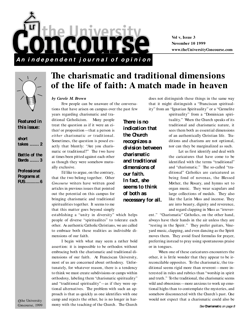The ideal of perfecting the mind is timeless
by Michael Houser
It is with good reason, it seems, that the last few Concourse issues have dwelt at such length on the purpose of a liberal education. It is a question of critical importance for any FUS student who wants to see what he is doing here. So at the risk of wearying readers by prolonging this discussion, I wish to make my contribution.
Jason Negri’s recent article on the importance of pre-professional programs and job training is a valuable contribution, coming as it does from someone with personal experience in alumni relations. His words about “entering ‘the world’ ready to sanctify the workplace” provide an important insight into the real significance of job preparation. However, though his point is well made, and the University must needs prepare students for careers, certain of his remarks on the “elitist” ideal of liberal education, “an. . . ideal whose time is past,” could be taken to convey a common modern prejudice, though one he may not actually share.
There is nothing “medieval” about the ideal of a liberal education. If such learning was emphasized more in the Middle Ages than it is today, this was at least in part because the Middle Ages realized more clearly the inherent value of truth and being, apart from technological skill. (This did not keep St. Bonaventure from showing how all arts, even the mechanical, can be brought back to God.) If our age values practical knowledge more than liberal, it is in part because of Francis Bacon’s notion that “knowledge is power,” an idea which, though influential in our technical progress, has greatly harmed the search for truth in the last few centuries. I do not think Mr. Negri really holds this extremely pragmatic view. I merely think that some of his words reveal a certain “chronological snobbery,” and contempt for the past which is all too common in modern universities.
If liberal education is truly a good which perfects our human nature, then the time of day doesn’t much matter. Again, to speak of liberal education as “ivory tower,” “elitist,” “myopic,” or “not looking beyond the rhetoric,” seems to suggest that the perfection of the intellect which liberal education seeks is something merely for the snobbish and sophisticated, a matter of vanity. Though we well know that intellectual pride is always a danger, this should not stop us from seeking to develop the faculties that make us distinctively human.
Mr. Negri is on target when he reminds us that, like it or not, we must prepare to enter the work force. And many of his remarks show that he truly does appreciate the value of knowledge for its own sake. I simply feel that certain of his statements seem to show disdain for the liberal arts, as if they were not useful in the long run—a view only too common among our contemporaries.
Michael Houser, Freshman, philosophy major


